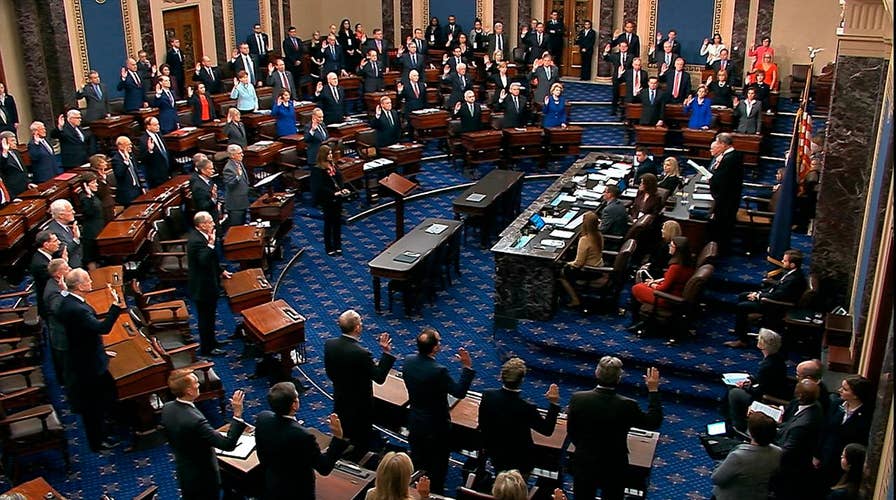Senate debates impeachment trial parameters and witnesses
Fox News senior political analyst Brit Hume weighs in on impeachment trial ground rules.
The Senate is set to begin its trial session in the impeachment of President Trump on Tuesday afternoon, when lawmakers will hash out the terms and details for the ground rules that will govern proceedings.
Here’s how it will all go down:
By rule, the trial will begin at 1 p.m. EST.
Tuesday will be the first day House managers and the president's defense are physically in the Senate chamber.
The president's defense is being led by White House Counsel Pat Cipollone and Trump attorney Jay Sekulow. But late Monday, in a surprise move, a slew of high-profile House Republicans announced that they would formally join the president's team — including Reps. Jim Jordan, Doug Collins, John Ratcliffe, Mark Meadows, Elise Stefanik, Lee Zeldin, Debbie Lesko and Mike Johnson.
"Throughout this process, these Members of Congress have provided guidance to the White House team, which was prohibited from participating in the proceedings concocted by the Democrats in the House of Representatives," White House press secretary Stephanie Grisham said in a statement Monday. "The President looks forward to their continued participation and is confident that the Members will help expeditiously end this brazen political vendetta on behalf of the American people."
HOUSE IMPEACHMENT MANAGERS CALL TRUMP 'FRAMERS' WORST NIGHTMARE COME TO LIFE' IN NEW BRIEF
House Speaker Nancy Pelosi has tapped seven lawmakers to prosecute the case against the president. The managers include House Intelligence Committee Chairman Adam Schiff, D-Calif., and House Judiciary Committee Chairman Jerrold Nadler, D-N.Y. Pelosi also tapped House Democratic Caucus Chairman Hakeem Jeffries, D-N.Y.; Reps. Jason Crow, D-Colo.; Val Demings, D-Fla.; Sylvia Garcia, D-Texas; and Zoe Lofgren D-Calif.
The first order of business Tuesday for the Senate will be swearing in Sen. Jim Inhofe, R-Okla., who was the only member not present when senators were sworn in last week by U.S. Chief Justice John Roberts. Following Inhofe’s swearing-in, there is likely to be a short period of administrative activity over documents.
Once the Senate gets through the basics, Senate Majority Leader Mitch McConnell, R-Ky., will take the floor and formally offer his organizing resolution, which will lay out the wireframe and terms for the trial. Once McConnell introduces his proposal, the House managers and the president’s legal defense will debate the plan.
Under McConnell's proposal, the prosecution will have 12 hours and the defense will have 12 hours. But according to sources, there is an appetite to reduce those time periods, possibly to "the single digits," putting the trial on a faster track than originally anticipated.
It will be up to Senate Minority Leader Chuck Schumer, D-N.Y., to offer a counterproposal, which is likely to include requests of witnesses and additional documents — despite McConnell’s repeated insistence that the organizing resolution is passed before discussing witnesses, an issue he vows would be touched upon later in the trial.
Schumer’s proposal will also get two hours of debate from the House managers and Trump’s defense.
The topic of witnesses has been at issue since the House passed the articles of impeachment – charges of abuse of power and obstruction of Congress – in mid-December. Pelosi, D-Calif., had been holding onto the articles in a bid to extract favorable terms for the trial, including a commitment from McConnell to call witnesses, but she ended her delay last week after he made it clear he was unwilling to negotiate.
McConnell has repeatedly said that his proposal for the organizing resolution would mirror the one that governed then-President Bill Clinton’s impeachment trial in 1999. That resolution set a time frame for the trial to begin, with the opportunity for lawmakers to determine how to proceed on potential witness testimony and additional documents at a later point after both the president’s defense and the House impeachment managers made their opening statements.
TRUMP TEAM CALLS 'FLIMSY' IMPEACHMENT 'DANGEROUS PERVERSION OF THE CONSTITUTION' IN LENGTHY FILING
As for possible witnesses, Democrats have called for testimony from former National Security Adviser John Bolton for weeks. Bolton, earlier this month, signaled that he would be open to testifying, and would comply with the request, should he receive a congressional subpoena.
Republicans, though, have warned of “witness reciprocity,” which would mean that GOP senators could request testimony from their own witnesses in exchange for Democrat-sought witness testimony.
Meanwhile, after those hours of debate on both the McConnell proposal and Schumer counterproposal, Fox News has been told that a closed Senate session could take place — meaning that the public, press, the impeachment managers and the president’s defense will be asked to leave, leaving just the senators and Chief Justice Roberts in the chamber. During this closed session, the Senate would debate how it will handle Schumer and McConnell’s proposals.
At some point in the evening, the Senate will return to open session with an agreement, or no agreement, on how to deal with the proposals from McConnell and Schumer.
The Senate will vote on the various proposals, and branches of those proposals, and are technically one or two steps removed from the main issue at hand, which will be the McConnell proposal. These votes, which are expected to take place throughout the night, could instead have the consequence of killing certain proposals.
The final vote of the night would be on the final McConnell plan. That roll call vote, and only that roll call vote, will dictate how the Senate conducts the trial.
Fox News' John Roberts contributed to this report.














































